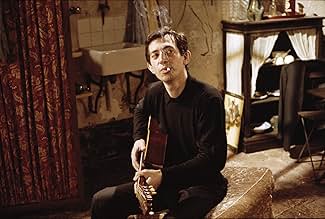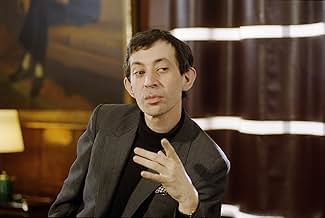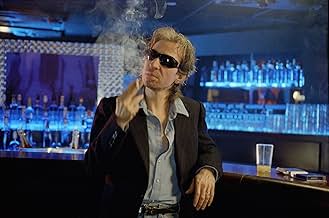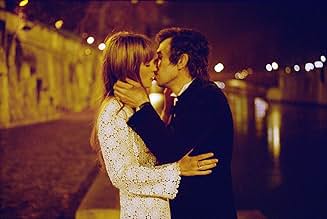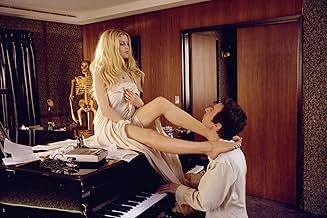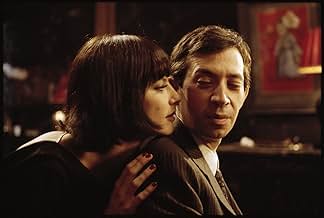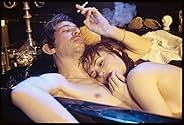Gainsbourg - Der Mann, der die Frauen liebte
Originaltitel: Gainsbourg (Vie héroïque)
IMDb-BEWERTUNG
6,9/10
10.513
IHRE BEWERTUNG
Ein Blick auf das Leben des französischen Sängers Serge Gainsbourg, vom Aufwachsen im von den Nazis besetzten Paris der 1940er Jahre über seine Jahre als Songschreiber in den 1960er Jahren b... Alles lesenEin Blick auf das Leben des französischen Sängers Serge Gainsbourg, vom Aufwachsen im von den Nazis besetzten Paris der 1940er Jahre über seine Jahre als Songschreiber in den 1960er Jahren bis zu seinem Tod 1991.Ein Blick auf das Leben des französischen Sängers Serge Gainsbourg, vom Aufwachsen im von den Nazis besetzten Paris der 1940er Jahre über seine Jahre als Songschreiber in den 1960er Jahren bis zu seinem Tod 1991.
- Auszeichnungen
- 7 Gewinne & 11 Nominierungen insgesamt
Dinara Drukarova
- Olga Ginsburg (la mère)
- (as Dinara Droukarova)
Empfohlene Bewertungen
The life story of Serge Gainsbourg had to be filmed, and as he's one of the famous Frenchmen who aren't in fact Belgian, it's only a surprise that it took so long. That his life spanned the Nazi occupation to the rise of Disco would stretch credibility if this were fiction, but as it's all more or less true the director, who is already an accomplished graphic artist, manages to lift it to the level of slightly absurd fiction. Mixing in animation, self-consciously stagey sets and a life-sized puppet as Gainsbourg's dreaded alter ego.
Even the sordid lowlife is given the big treatment, and the early days in the garret look unashamedly glamorous as they would if re-imagined for an opera set or a Salvador Dali dream sequence, as director Joann Sfar lays it on with a trowel.
The episodic nature of the story gives it a rather patchy feel though, and I couldn't help thinking that one or two episodes, especially the cute Hollywood-style musical scene with Brigitte Bardot, could have been shorter. Bardot was just one of the high-profile women Gainsbourg captured, and so was the muse of the existentialists, Juliette Greco.The casting is pretty uncanny with the possible exception of Greco, who was never that model-thin.
Gainsbourg has always been, at least outside France, more famous for being cool than for his music. But his reworking of La Marseillaise which so upset the rightwing patriots of the Seventies was nothing but excellent. I'll go back just to hear that Sly and Robbie riddim one more time.
Quite a substantial feast but it's worth building up an appetite in advance. And of course, you get Jane Birkin and... That Song.
Even the sordid lowlife is given the big treatment, and the early days in the garret look unashamedly glamorous as they would if re-imagined for an opera set or a Salvador Dali dream sequence, as director Joann Sfar lays it on with a trowel.
The episodic nature of the story gives it a rather patchy feel though, and I couldn't help thinking that one or two episodes, especially the cute Hollywood-style musical scene with Brigitte Bardot, could have been shorter. Bardot was just one of the high-profile women Gainsbourg captured, and so was the muse of the existentialists, Juliette Greco.The casting is pretty uncanny with the possible exception of Greco, who was never that model-thin.
Gainsbourg has always been, at least outside France, more famous for being cool than for his music. But his reworking of La Marseillaise which so upset the rightwing patriots of the Seventies was nothing but excellent. I'll go back just to hear that Sly and Robbie riddim one more time.
Quite a substantial feast but it's worth building up an appetite in advance. And of course, you get Jane Birkin and... That Song.
Where does this amazing film come from? Who is Joann Sfar, a director I never heard about before? The easiest answer at hand was the wikipedia entry which tells us that Sfar is a well known comics author in the fabulous French-Belgian tradition. He is of Jewish origin, and his next film is an adaptation of one of his comics successes called The Rabbi's Cat.
And suddenly all makes sense. The opening scenes of the film contain the key of the biography of French musician and poet Serge Gainsbourg as imagined by Sfar. We see Lucien Ginzburg, a Jewish kid in occupied Paris during WWII daring not only to laugh in fronde at the nose of the collaborationist police by being the first in line to receive his yellow Star of David as a sign of nobility rather than an anathema, but moreover, to transform in his mind and his sketch drawings the fat rapacious Jew on the Vichy posters in the thin, stylish, long nose and big years Gueule - the alter-ego who will guide his steps and feed his revenging self-confidence for the rest of his life.
The combination of acting and cartoon is not a new thing, but it has never been tried before in a biopic to the best of my knowledge. Sure, it is not the usual respectful biopic but it's the vision of Sfar about Ginzburg - Gainsbourg, and Sfar he says in the final text before the credits was more interested about Gainsbourg lies than by his perceived truths. Moreover, for sure Gainsbourg himself would not have appreciated a respectful film. Ironically under-titled 'Vie heroique' (heroic life) the film takes us though the artistic and especially womanizing career of Gainsbourg from the early 50s to the late 70s. We see him in the company of such French cultural icon as Boris Vian and especially of fabulous women such as Juliette Greco, Brigitte Bardot and Jane Birkin (and actually the list in the film is very partial). I enjoyed each of the scenes in this part of the film which combine style, attention to details (just follow how fashion changes marking the progress of time) and deep understanding of the atmosphere of the Parisian clubs and artistic milieu in the mythic mid-20 century. His Gueule alter-ego mentors him though this trip and when he decides to renounce his patronizing, it's the beginning of the end - the charisma goes away and the effects of his excesses slowly destroy him. Maybe a little more of his art would have provided an even more complex and balanced image of the person that Gainsbourg was - this would be my only observation.
The choice of Eric Elmosnino as Gainsbourg is excellent, he drives the character from the insecurity of the young age to the decay of the end, all the time with charm and deep empathy. He proves a perfect understanding of the intentions of the director and a full identification with the identity dilemmas of the French-Jewish Gainsbourg. Laetitia Casta is a perfect replica of Bardot. Lucy Gordon is mastering very well Jane Birkin's role. Her maturity makes even harder to explain the suicide of the young actress a few days before the film was presented in avant-premiere at Cannes.
And suddenly all makes sense. The opening scenes of the film contain the key of the biography of French musician and poet Serge Gainsbourg as imagined by Sfar. We see Lucien Ginzburg, a Jewish kid in occupied Paris during WWII daring not only to laugh in fronde at the nose of the collaborationist police by being the first in line to receive his yellow Star of David as a sign of nobility rather than an anathema, but moreover, to transform in his mind and his sketch drawings the fat rapacious Jew on the Vichy posters in the thin, stylish, long nose and big years Gueule - the alter-ego who will guide his steps and feed his revenging self-confidence for the rest of his life.
The combination of acting and cartoon is not a new thing, but it has never been tried before in a biopic to the best of my knowledge. Sure, it is not the usual respectful biopic but it's the vision of Sfar about Ginzburg - Gainsbourg, and Sfar he says in the final text before the credits was more interested about Gainsbourg lies than by his perceived truths. Moreover, for sure Gainsbourg himself would not have appreciated a respectful film. Ironically under-titled 'Vie heroique' (heroic life) the film takes us though the artistic and especially womanizing career of Gainsbourg from the early 50s to the late 70s. We see him in the company of such French cultural icon as Boris Vian and especially of fabulous women such as Juliette Greco, Brigitte Bardot and Jane Birkin (and actually the list in the film is very partial). I enjoyed each of the scenes in this part of the film which combine style, attention to details (just follow how fashion changes marking the progress of time) and deep understanding of the atmosphere of the Parisian clubs and artistic milieu in the mythic mid-20 century. His Gueule alter-ego mentors him though this trip and when he decides to renounce his patronizing, it's the beginning of the end - the charisma goes away and the effects of his excesses slowly destroy him. Maybe a little more of his art would have provided an even more complex and balanced image of the person that Gainsbourg was - this would be my only observation.
The choice of Eric Elmosnino as Gainsbourg is excellent, he drives the character from the insecurity of the young age to the decay of the end, all the time with charm and deep empathy. He proves a perfect understanding of the intentions of the director and a full identification with the identity dilemmas of the French-Jewish Gainsbourg. Laetitia Casta is a perfect replica of Bardot. Lucy Gordon is mastering very well Jane Birkin's role. Her maturity makes even harder to explain the suicide of the young actress a few days before the film was presented in avant-premiere at Cannes.
GAINSBOURG (Vie héroïque)
from the Studio Canal stable depicts the life story of Serge Gainsbourg from early childhood in the 1930's and 40's, until just before his death in 1991.
Born Lucien Ginsburg – and as an impressionable youth he felt outcast as being a Jewish child in Nazi occupied Paris in the 1940's – leading him to develop an imaginary friend who adopted an increasingly grotesque caricature / persona of himself that would lead him on to do more and more outrageous things to "rebel" his situation and to attempt to gain an element of "love" and "acceptance" from his notoriety.
A talented musician and artist, Lucien (who later was persuaded by friends to change his name to the more "acceptable" Serge Gainsbourg) became the darling of the social scene, charming his way through a succession of affairs with beautiful women – most notably Brigitte Bardot, Juliette Greco, and Jane Birkin.
I'm surprised that they didn't have a cigarette company sponsoring this movie – as the sheer amount of fags smoked during this film must be some sort of record!
After the showing of the film (at the Cineworld, Haymarket, London) we were treated to a Question and Answer session with the Writer / Director of this movie JOANN SFAR, who explained that the idea for the film came from his own graphic novel on Serge Gainsbourg penned by JOANN SFAR – and this pretty much formed the construct and ambiance of the movie – it is highly graphical and visual in it's content – much of it being fantasy visions and flashbacks within Gainsbourg's mind. Talking from the heart – Joann showed a real passion for the film, and was very open as to how the film was created.
Gainsbourg became the darling of French society with his talent and flair – but he also would court scandal and became infamous for the release of "Je t'aime... moi non plus" (which he originally wrote for Bardot) and the seemingly disrespectful reggae version of the French national anthem "La Marseillaise", but love him or loath him – you couldn't ignore him ..
The whole movie is very atmospheric, and some of the casting of this film was inspired – especially the terrific performances by Eric Elmosnini in the title role, the stunning beautiful Laetitia Casta as Brigitte Bardot, Lucy Gordon as Jane Birkin, Anna Mouglalis as Juliette Greco and Kacey Mottet Klein as the young Lucien Ginsburg.
At the end credits of the film is a dedication "to Lucy" which referred to the actress Lucy Gordon – who (the director explained) played the part of Jane Birkin in the film – and who had tragically committed suicide during the final editing parts of the film – a talented actress – and a sad loss.
At 2 hours 10mins long, in French with English subtitles GAINSBOURG will not be everyone's cup of tea but the film DOES keep you entertained and if you give it a chance, I'm sure that you will not be disappointed ...
It's not big or clever to smoke, and it doesn't make you look cool unless you happen to be Serge Gainsbourg !
GAINSBOURG is on general release from 30th July 2010
Born Lucien Ginsburg – and as an impressionable youth he felt outcast as being a Jewish child in Nazi occupied Paris in the 1940's – leading him to develop an imaginary friend who adopted an increasingly grotesque caricature / persona of himself that would lead him on to do more and more outrageous things to "rebel" his situation and to attempt to gain an element of "love" and "acceptance" from his notoriety.
A talented musician and artist, Lucien (who later was persuaded by friends to change his name to the more "acceptable" Serge Gainsbourg) became the darling of the social scene, charming his way through a succession of affairs with beautiful women – most notably Brigitte Bardot, Juliette Greco, and Jane Birkin.
I'm surprised that they didn't have a cigarette company sponsoring this movie – as the sheer amount of fags smoked during this film must be some sort of record!
After the showing of the film (at the Cineworld, Haymarket, London) we were treated to a Question and Answer session with the Writer / Director of this movie JOANN SFAR, who explained that the idea for the film came from his own graphic novel on Serge Gainsbourg penned by JOANN SFAR – and this pretty much formed the construct and ambiance of the movie – it is highly graphical and visual in it's content – much of it being fantasy visions and flashbacks within Gainsbourg's mind. Talking from the heart – Joann showed a real passion for the film, and was very open as to how the film was created.
Gainsbourg became the darling of French society with his talent and flair – but he also would court scandal and became infamous for the release of "Je t'aime... moi non plus" (which he originally wrote for Bardot) and the seemingly disrespectful reggae version of the French national anthem "La Marseillaise", but love him or loath him – you couldn't ignore him ..
The whole movie is very atmospheric, and some of the casting of this film was inspired – especially the terrific performances by Eric Elmosnini in the title role, the stunning beautiful Laetitia Casta as Brigitte Bardot, Lucy Gordon as Jane Birkin, Anna Mouglalis as Juliette Greco and Kacey Mottet Klein as the young Lucien Ginsburg.
At the end credits of the film is a dedication "to Lucy" which referred to the actress Lucy Gordon – who (the director explained) played the part of Jane Birkin in the film – and who had tragically committed suicide during the final editing parts of the film – a talented actress – and a sad loss.
At 2 hours 10mins long, in French with English subtitles GAINSBOURG will not be everyone's cup of tea but the film DOES keep you entertained and if you give it a chance, I'm sure that you will not be disappointed ...
It's not big or clever to smoke, and it doesn't make you look cool unless you happen to be Serge Gainsbourg !
GAINSBOURG is on general release from 30th July 2010
Lucien 'Serge Gainsbourg' Ginsburg. Artist. Writer. Performer. Alcoholic. Smoker. Rebel. Womanizer. Genius? Joann Sfar's film documents the sporadic lifestyle of the famous French artist Serge Gainsbourg (Eric Elmosnino), whose life contained no boundaries, no objects off limit, and continually tested the patience of those huddled together around him. Beginning with a young Gainsbourg developing his taste for painting aspiring models in Nazi-Occupied France as a mere teenager, the film thereupon concentrates primarily upon his relationships with various beautiful women and his life choices in regards to his ever-changing occupation over his sixty-year-life-span.
What makes this film work so well as a biopic is the truly ingenious performances by both Kacey Mottet Klein (Young Gainsbourg) and Eric Elmosnino (Adult Gainsbourg) who both somewhat beautifully represent such a tragic figure throughout his whole on-screen lifetime. Kacey portrays Gainsbourg as a boy who is maturing faster than those other children around him, so far so, that he explains to one of the schoolchildren the reason that he is good at drawing pubic hairs is because he has had an up-close and personal experience with them before. While he is also shown to be a lonely child, an outcast as Jewish child growing up in Nazi-Occupied France, and thus he develops an affable 'imaginary friend' to keep himself company. Born as small, soft head that watches over young Gainsbourg as he sleeps in the woods to avoid the Nazi soldiers, his only friend soon becomes his worst enemy as he matures into a complicated man. His once pleasant 'imaginary friend' is now a grotesque being with a large nose, long-thin fingers and an affection for cigarettes and bullying Gainsbourg. He continually berates insults, prods and engages Serge, providing the viewpoint that he himself was his harshest critic, and a critic he could not simply dismiss without entire control over his life.
Aside from the performances, the way Sfar allows the films narrative to flow in a temporal manner with no mention of time, or calendar dates, further draws the audience in to Gainsbourg's contrived world. The only way to tell when an event shifts forward in his lifetime, is through his own physical deterioration from old age which is heavily dictated by his excessive abuse of alcohol and tobacco. But as Gainsbourg becomes older, his sexual conquests stay the same age; from Elisabeth (Deborah Grall), to Jane (the late Lucy Gordon), and to an affair with the insatiable Brigitte Bardot (Laetitia Casta), before he eventually settles down with Bambou (Mylene Jampanoi), who would be his final partner. These are all young, vulnerable women who Gainsbourg exploits for his own sexual misgivings, and once they become too old, or too boring, he discards them like a child throwing away an old toy to badger his parents for a new, more expensive model.
Joann Sfar beautifully flowing biopic paints Serge Gainsbourg as a shallow, misogynistic, grumpy old man, who once had dreams of becoming famous for doing anything, but once those dreams were realised, greed and narcissism triumphed over his once forgotten ambitions. Utilizing his gift for writing, artistry and music Gainsbourg chose the route of controversy and scandal over that of happiness and family, which is exemplified in his response to the media after he had a heart attack. When the reporters asked what he will be doing now after such a dangerous and life threatening operation, Gainsbourg calmly asserted to those in attendance that he will "continue to smoke many more cigarettes and drink much more alcohol."
What makes this film work so well as a biopic is the truly ingenious performances by both Kacey Mottet Klein (Young Gainsbourg) and Eric Elmosnino (Adult Gainsbourg) who both somewhat beautifully represent such a tragic figure throughout his whole on-screen lifetime. Kacey portrays Gainsbourg as a boy who is maturing faster than those other children around him, so far so, that he explains to one of the schoolchildren the reason that he is good at drawing pubic hairs is because he has had an up-close and personal experience with them before. While he is also shown to be a lonely child, an outcast as Jewish child growing up in Nazi-Occupied France, and thus he develops an affable 'imaginary friend' to keep himself company. Born as small, soft head that watches over young Gainsbourg as he sleeps in the woods to avoid the Nazi soldiers, his only friend soon becomes his worst enemy as he matures into a complicated man. His once pleasant 'imaginary friend' is now a grotesque being with a large nose, long-thin fingers and an affection for cigarettes and bullying Gainsbourg. He continually berates insults, prods and engages Serge, providing the viewpoint that he himself was his harshest critic, and a critic he could not simply dismiss without entire control over his life.
Aside from the performances, the way Sfar allows the films narrative to flow in a temporal manner with no mention of time, or calendar dates, further draws the audience in to Gainsbourg's contrived world. The only way to tell when an event shifts forward in his lifetime, is through his own physical deterioration from old age which is heavily dictated by his excessive abuse of alcohol and tobacco. But as Gainsbourg becomes older, his sexual conquests stay the same age; from Elisabeth (Deborah Grall), to Jane (the late Lucy Gordon), and to an affair with the insatiable Brigitte Bardot (Laetitia Casta), before he eventually settles down with Bambou (Mylene Jampanoi), who would be his final partner. These are all young, vulnerable women who Gainsbourg exploits for his own sexual misgivings, and once they become too old, or too boring, he discards them like a child throwing away an old toy to badger his parents for a new, more expensive model.
Joann Sfar beautifully flowing biopic paints Serge Gainsbourg as a shallow, misogynistic, grumpy old man, who once had dreams of becoming famous for doing anything, but once those dreams were realised, greed and narcissism triumphed over his once forgotten ambitions. Utilizing his gift for writing, artistry and music Gainsbourg chose the route of controversy and scandal over that of happiness and family, which is exemplified in his response to the media after he had a heart attack. When the reporters asked what he will be doing now after such a dangerous and life threatening operation, Gainsbourg calmly asserted to those in attendance that he will "continue to smoke many more cigarettes and drink much more alcohol."
I did watch this film in it's premiere in Athens, at the festival of Franchophone films.I liked the movie which incorporated many surreal and fantasy elements in the linear narrative of the life of the hero. He had an alter ego, which was the substantiation of a childhood fantasy which always tried to tempt him to follow the broad path that led to riches, fame, sex and power. He followed the advice of his evil other self and he became the public icon we know from history and the media. Emphasis is also given to his Jewishness and his courage to manifest it before collaborationist authorities as a young boy.
Excepting the marked surreal elements which the director in an introductory speech attributed to the fact that he is also a comic strip creator, the film emphasizes what we already know, that is his incessant womanizing, publicity seeking and studied provocative stance, culminating in his memorable if controversial rendering of the Marselleise-the French national anthem-in a reggae music version and a refrain that was full of irony.
The sometimes overemphasized description of his rampant sexuality drove some of the audience out of the theatre as did the depiction of his reggae version of the French national anthem. But this was obviously an overreaction due either to ignorance or desire to cut a figure. If you had the slightest idea of who Gainsbourgh was, you would not be expecting anything else from a movie dedicated to his life story.
Because Gainsbough was prone to the pleasures of the flesh with women famous or ordinary, many impressive actresses such as Laetitia Casta and Anna Muglalis appear in the movie portraying the gorgeous women he had affairs with. The whole impression you form is that he had been a anti-authoritarian bobo(bourgeois-Boheme) before this term had been invented.
There is also a sensitive depiction of his relationship with his parents, which was closer and more intimate than one would expect from a man who had such an obvious (real or affected) grudge towards authority.The actresses play convincingly the women of his life, who were glamorous and sexy. In the end one is left with the question whether such a life is enviable and worthy of emulation or example to avoid. whichever answer each one reaches, as a spectacle it is surely interesting to see.
Excepting the marked surreal elements which the director in an introductory speech attributed to the fact that he is also a comic strip creator, the film emphasizes what we already know, that is his incessant womanizing, publicity seeking and studied provocative stance, culminating in his memorable if controversial rendering of the Marselleise-the French national anthem-in a reggae music version and a refrain that was full of irony.
The sometimes overemphasized description of his rampant sexuality drove some of the audience out of the theatre as did the depiction of his reggae version of the French national anthem. But this was obviously an overreaction due either to ignorance or desire to cut a figure. If you had the slightest idea of who Gainsbourgh was, you would not be expecting anything else from a movie dedicated to his life story.
Because Gainsbough was prone to the pleasures of the flesh with women famous or ordinary, many impressive actresses such as Laetitia Casta and Anna Muglalis appear in the movie portraying the gorgeous women he had affairs with. The whole impression you form is that he had been a anti-authoritarian bobo(bourgeois-Boheme) before this term had been invented.
There is also a sensitive depiction of his relationship with his parents, which was closer and more intimate than one would expect from a man who had such an obvious (real or affected) grudge towards authority.The actresses play convincingly the women of his life, who were glamorous and sexy. In the end one is left with the question whether such a life is enviable and worthy of emulation or example to avoid. whichever answer each one reaches, as a spectacle it is surely interesting to see.
Wusstest du schon
- WissenswertesThe project was originally envisioned with Serge Gainsbourg's real life daughter, actress Charlotte Gainsbourg to play him in keeping with the film's surreal and fairytale-esque tone. Six months into rehearsals and preparation Gainsbourg pulled out telling director Joann Sfar, it was proving too emotionally painful and he would have to make his "beautiful film" without her. Sfar had always approached the film with her in mind and was ready to abort the project when fate lead him to Eric Elmosnino.
- PatzerThe young Gainsbourg is shown drawing left-handed, but the adult Gainsbourg becomes right-handed.
- Zitate
Serge Gainsbourg: [after a man tips him while he plays the piano] What are you fucking kidding me? I'm not a jukebox!
- Crazy Credits"Pour Lucy" i.e. this was Lucy Gordon 's last film.
- Alternative VersionenEngland is the first territory to release a new cut of the film, running 14 minutes shorter than the previous version and is Joann Sfar's preferred one. Changes include -
- Deletion of the scene where young Serge pleads in vain for his mother to buy him a gun to play with, even attempting to bribe her by saying he'll work harder on the piano. This precedes the scene where he steals the gun from the shop.
- Deletion of the scene where Serge and Boris Vian walk to his apartment and the two lie in the road in an effort to stop a cab. While they wait Serge reveals he has a double that follows him around to which Vian replies his is a werewolf. However two policemen soon cut the conversation short. (This precedes Serge arriving at Boris's apartment and explains a later scene where a drunken Serge lies in the road before having the police escort to his concert)
- Longer scene of the "Baby Pop" groupies, as Gainsbourg wakes up in bed with two naked women as his Mug joyously tosses bank statements at him revealing how rich he is from "Poupée de cire, poupée de son" alone! This is the original lead in to "Qui Est In Qui Est Out".
- The groupies and party to "Qui Est In Qui Est Out" is cut short, removing Serge narrating about "the mouth being the primary sexual organ". His narration reveals the girls in the room he has slept with and how he was with them. It reveals Gainsbourg's occasional cruel streak and precedes the angry neighbor banging on the door.
- After Gainsbourg recites La Marseillaise at the press conference, we then see young Serge repeating it and triumphantly raising his fist to the audience.
- Deletion of a short exchange in the nightclub when a reveller comments to Gainsbourg about him being parodied on a French TV show. The new version removes these lines either because the show is unknown outside of France or because it doesn't tie in as being the night Gainsbourg met his wife Bambou as that TV show wouldn't air until years later. Sfar has said this new version will be the one further released worldwide.
- VerbindungenFeatured in De wereld draait door: Folge #5.128 (2010)
Top-Auswahl
Melde dich zum Bewerten an und greife auf die Watchlist für personalisierte Empfehlungen zu.
Details
- Erscheinungsdatum
- Herkunftsland
- Offizielle Standorte
- Sprachen
- Auch bekannt als
- Gainsbourg - Popstar, Poet, Provokateur
- Drehorte
- Rue de Verneuil, Paris 6, Paris, Frankreich(Gainsbourg's house)
- Produktionsfirmen
- Weitere beteiligte Unternehmen bei IMDbPro anzeigen
Box Office
- Budget
- 11.500.000 € (geschätzt)
- Bruttoertrag in den USA und Kanada
- 233.007 $
- Eröffnungswochenende in den USA und in Kanada
- 25.189 $
- 4. Sept. 2011
- Weltweiter Bruttoertrag
- 12.220.456 $
- Laufzeit
- 2 Std. 15 Min.(135 min)
- Farbe
- Sound-Mix
- Seitenverhältnis
- 2.35 : 1
Zu dieser Seite beitragen
Bearbeitung vorschlagen oder fehlenden Inhalt hinzufügen




